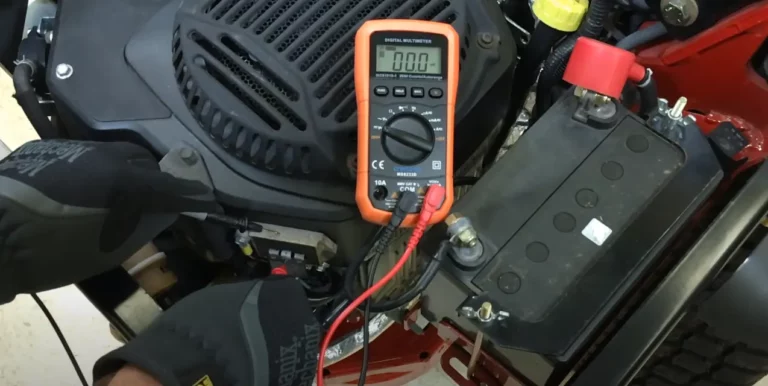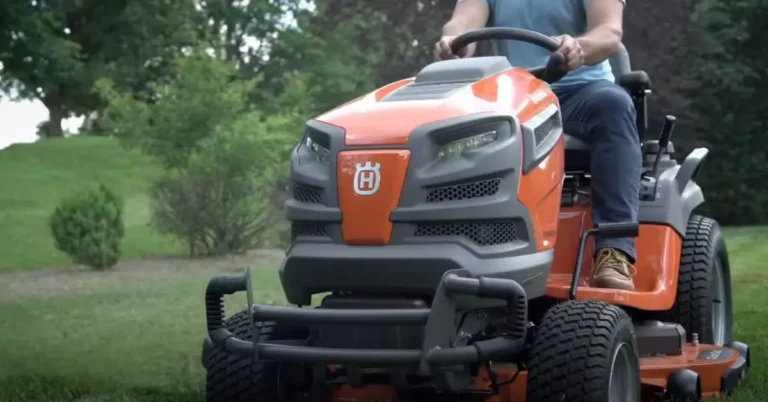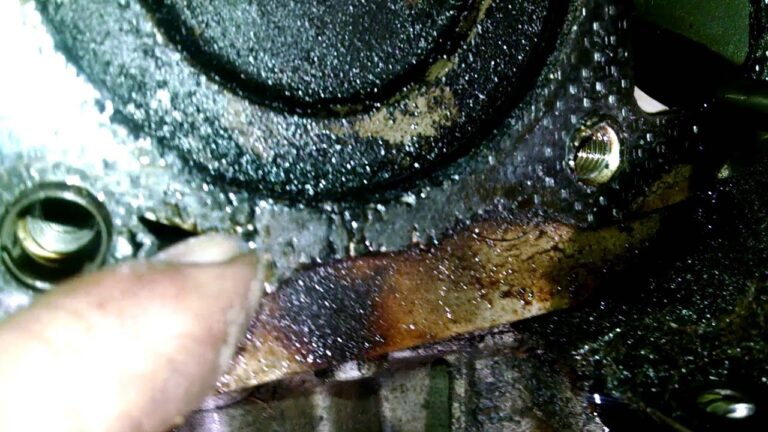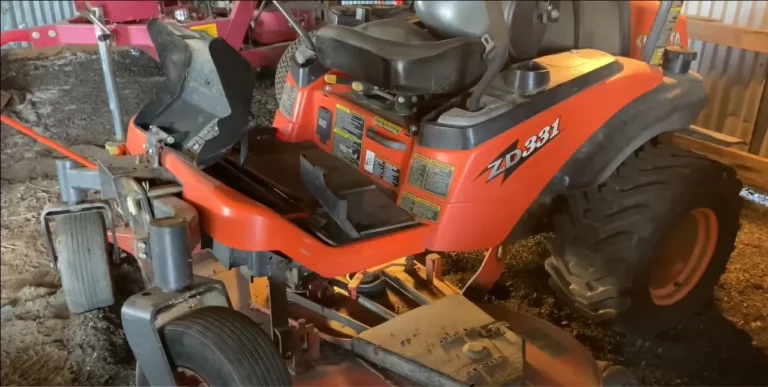Lawn Mower Overheating Symptoms (From Reasons to Solutions)
If you notice your riding lawn mower spewing smoke or running hotter than usual, it’s a sign that something’s wrong – these are lawn mower overheating symptoms.
This is a serious issue because, in most scenarios, mowers stop working instantly.
Lawnmowers overheat for many reasons. The most common ones are that the engine isn’t working properly, air vents are blocked, dull mower blades, air filter or cooling fin are blocked, deck issue, or you’re using low-quality oil and fuel.
Luckily, you don’t have to be a professional mechanic to solve these minor issues. You only need knowledge about how to fix which you’ll get here in our guide.
So gear up with us as we jump into this guide on detecting symptoms & fixing overheating issues.
What are the Lawn Mower Overheating Symptoms?
Overheating is a common problem faced by lawnmower owners.
Some of the symptoms of an overheating lawn mower include engine smoke, blackened or discolored spark plug wires, increasing engine temperatures, and unusual noise from the engine.
Whatever the reason, the smoke’s symptoms shouldn’t be taken lightly. If you do that, you may lose your mower or spend a lot on maintenance.
So the best is to find the reason as soon as possible.
You can check our guide below to understand the most common reasons.
Once you detect the reason, follow the next part, which is following the solution, or contact any professional mechanic!
6 Reasons Why Lawn Mowers Overheat (With Solutions)
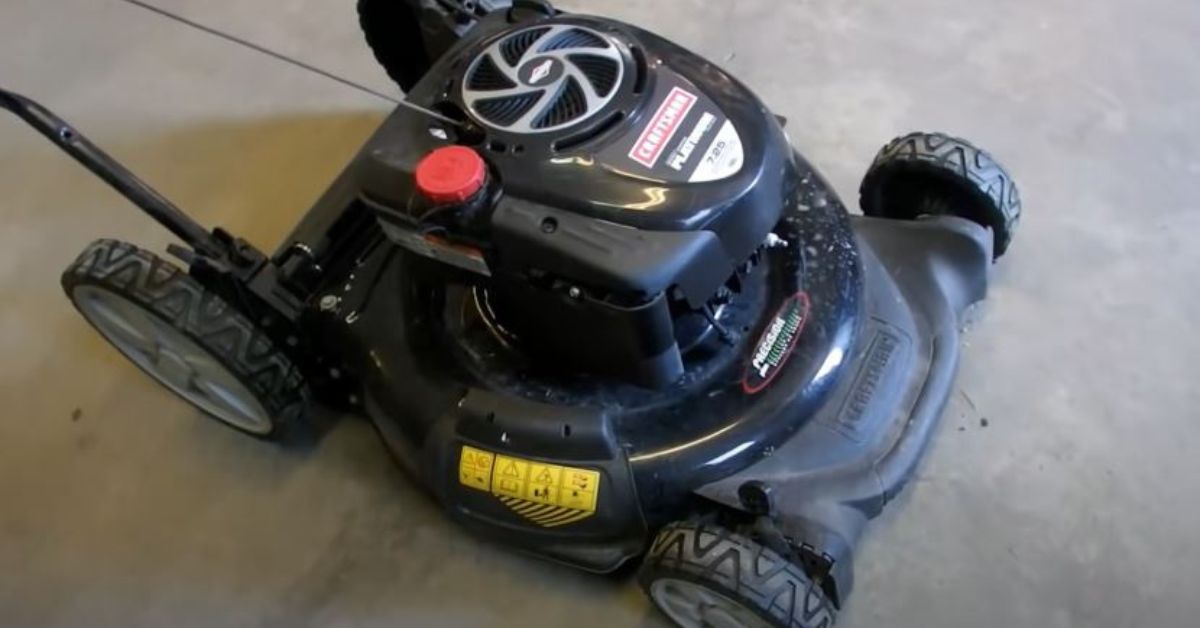
Let’s jump into the next part of this guide which is about the six main reasons why lawn mowers overheat. A
long with the reasons, you’ll get easy solutions that will save your money and lawnmowers from the overheating issue.
Using the Mower On Wet Grass
Before we go further into the reasons, are you sure that you’re using a lawn mower correctly?
Because sometimes machines overheat when we make mistakes by using them wrongly.
For example, do you know we can’t use a mower on wet grass? This is because wet grass can stick to the blade and the deck.
The build-up inside the engine casing blocks airflow, which increases the engine temperature and leads to serious damage.
Fixed: The solution to this issue is quite simple: just stop mowing the lawn when the grass is wet. And if your mower does become too hot, leave it a while before restarting it, then use it.
Also Read: How to Cut Grass Without a Lawn Mower? 6 Affordable Ways
Dull Mower Blades.
Taking proper care of your lawnmower’s blades is important for a healthy, fresh-looking lawn.
Dull mower blades can significantly decrease the mower’s performance and, in severe cases, cause it to become overheated.
When blades are too dull, the motor needs to work harder to cut the grass, generating more heat than normal.
And when the mower generates heat, we all know what happens; it will eventually stop working after some time.
Fixed: It’s important to sharpen and balance the mower blades twice per season.
To do this, remove the blades from the mower and use a sharpening tool to sharpen the edges. Afterward, balance the blade and install it again.
Clogged Air Filter.
You may not know, but every machine has a cooling system.
Thanks to the cooling system, the machine won’t generate heat and will remain at the normal temperature. The same rule applies to a lawn mower.
If a lawn mower is running extra hot, the first thing to look for is the air filter.
A clogged air filter will restrict the flow of air into the engine, which can cause the machine to overheat.
Fixed: Surprisingly, cleaning the air filter isn’t as difficult as it might seem to you.
Just remove the air filter from the mower and clean it with soap and water, or you can go with the carb spray.
Pro Tip – Write down checking the air filter condition in the monthly lawn mower maintenance routine. It will help keep a lawn mower running smoothly and prevent it from overheating due to poor airflow.
Also Read: How to Store Lawn Mower in Garage?
You can watch the video below to understand the types of air filters and how you can clean them efficiently.
Blocked Cooling Fin.
Have you ever heard the term cooling term? It’s an important mower function that you should be familiar with.
The reason is that cooling fins help maintain the engine’s temperature at a normal level.
If you don’t have cooling fins or they’re blocked with unsuitable airway materials and debris, the engine will overheat.
You can open the engine case and see whether there is debris or not. If not, then this might not be the issue.
Fixed: This problem can be solved by cleaning any build-up from the cooling fins or replacing them if necessary.
Ensuring proper airflow through cooling fins will solve the overheating issue instantly.
Clogged Deck Issue.
You’ve checked the engine, air filter, blades, and even cooling fins but are still unable to detect the issue.
If that’s the case, you should move towards checking the deck of the lawn mower.
A clogged deck is often the source of overheating issues because the grass is not getting cut properly, allowing the blade to get stuck or burn out.
If left unchecked, the deck can cause costly repairs and possibly damage to the engine.
Fixed: To solve the problem, check the bottom part of the deck, and if it’s clogged, then remove it and start the cleaning process.
Remember, it’s not a one-time process; you have to add it to the regular maintenance list.
Low-Quality Oil & Fuel.
It’s not necessary that lawn mowers overheat when there’s an issue with the internal part. Sometimes this issue happens when we use low-quality oil and fuel in the lawnmowers.
Think to yourself how a machine would work well when you’re not providing oil and good quality fuel.
Low-quality oil and fuel can’t lubricate the engine or burn with the same efficiency as higher-grade ones, thus leading to an overheated,
The low-quality oil and fuel cannot lubricate the mower’s engine with the same efficiency as higher-grade ones, thus leading to an underperforming and overheated mower.
Fixed: Check the engine oil level from time to time and replace low-quality oils or fuels with a higher-grade (octane 87 ratings) alternative.
Yes, it might be costly, but this is a good step if you don’t want to spend hard-earned money on maintenance every season.
Frequently Asked Questions (FAQs)
How can I prevent my lawn mower from overheating?
You can prevent the lawn mower from overheating by following these steps.
- First, find out why it’s overheating, whether it’s the issue with the engine or you’re doing something wrong.
- Then resolve the issue and make sure to follow a regular cleaning routine. Check oil levels, air filters, cooling fins, blade sharpness, deck, and so on.
How do I cool down my lawn mower?
If your lawn mower is overheated, park it in an open place so that cool air can circulate.
Turn off the mower engine and wait until it cools down. Afterward, you can again use the mower to mow the grass.
What are the signs that my lawn mower engine overheating?
One of the more obvious signs that your lawn mower engine is overheating is excessive smoke from the motor and black wire.
You may also hear dramatically increased noise levels and the mower will run slow as the airflow is restricted in the motor.
Conclusion
Smoke, black plug wires, and unusual noise are some of the most common lawn mower overheating symptoms. Once you see these symptoms, take immediate actions to resolve the issue.
You can check our guide to understand the possible reasons.
If the issue is with the internal parts like cooling fins, clogged air cleaners, deck, and blades, understand the solution carefully, then open the mower case; otherwise, you may lose your lawn mower.

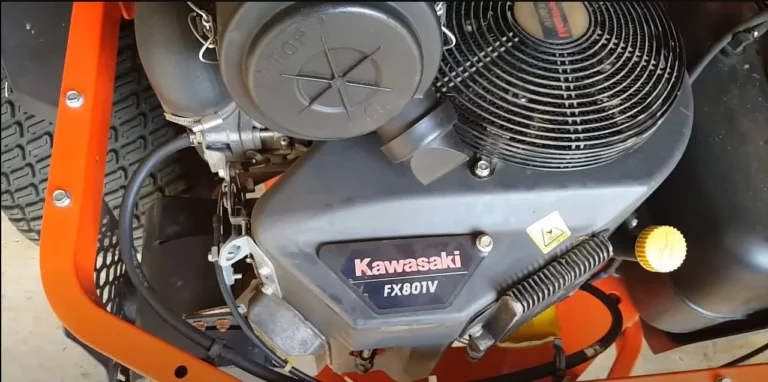
![7 Common Simplicity Zero Turn Mower Problems [Fixed]](https://yardcurator.com/wp-content/uploads/2023/06/10-Common-Simplicity-Zero-Turn-Mower-Electrical-Problems-768x402.webp)
